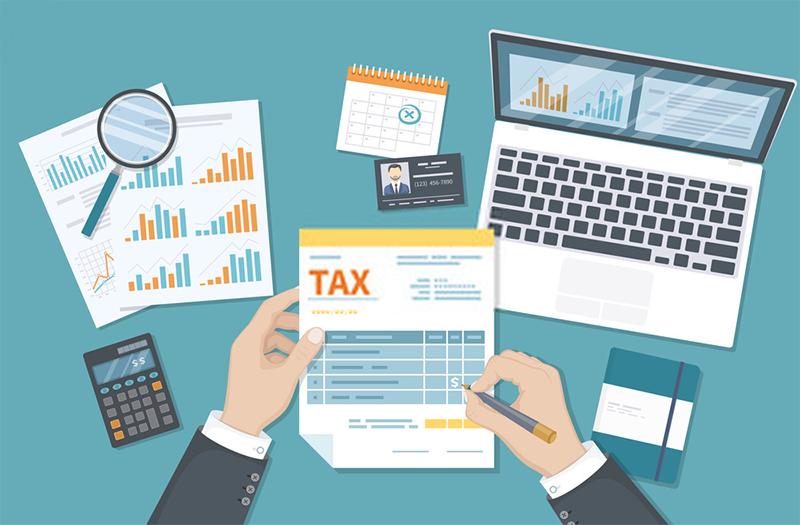Comprehensive Overview of All Types of Taxes Businesses Must Pay

In the business journey, having a clear understanding of the various taxes that businesses are required to pay is crucial. This article compiles detailed information on all types of taxes that businesses need to be aware of, helping you grasp the definitions, taxpayer responsibilities, calculation methods, filing deadlines, and corporate income tax incentives. Let’s explore the various taxes that a business needs to pay when operating in the article below.
Why Do Businesses Need to Pay Taxes?
Corporate taxes contribute significantly to the state budget. Revenue generated from various business taxes serves several purposes. Firstly, taxes play a vital role in constructing and maintaining essential infrastructure for business, including roads, bridges, and other public services. Taxes also enable the government to provide public services such as healthcare, education, and security, ensuring the well-being of businesses and communities.
Another reason businesses need to pay taxes is that taxes serve as a tool to regulate business activities within industry sectors. For instance, providing corporate income tax incentives or imposing higher taxes on certain sectors can encourage the development of crucial industries and limit the activities of sectors according to the strategic vision of the country. Additionally, taxes can impact the business environment and create fair competition among companies.

Corporate income tax incentives will be a tool for the State to encourage industries and occupations consistent with the national economic development path
The payment of taxes by businesses is not only a mandatory obligation but also comes with associated rights. The simplest example is that businesses are legally protected through tax compliance. Paying taxes ensures that a business operates legally and has the right to legal protection in case of litigation, disputes, and other legal matters.
In summary, tax payment is not just a legal obligation but also a way for businesses to contribute to the construction and maintenance of society and the economy. Understanding why businesses must pay taxes and being aware of the benefits they receive from tax payments is crucial in every country and economy. In the next part, let’s delve into the various types of taxes that businesses need to pay when engaging in business activities.
See more: Reasons foreign businesses should invest in Vietnam
License tax
License tax is a fixed tax that businesses are required to pay annually according to legal regulations. This tax is not dependent on the business’s revenue or profit but is determined based on the type of business and the scale of its operations.

Taxes need to be taken into account right from the moment you have the idea of creating a business
Subject to Pay
Business tax applies to all businesses and organizations engaged in business activities in Vietnam. The subjects required to pay business tax include both individual businesses and large corporations. Exemptions from business tax are granted to small-scale businesses or those transitioning from individual business entities, exempting them from the business tax for 3 years from the date of business registration certificate issuance.
Tax Rates
The business tax rate is usually determined based on the type of business and the scale of its operations. The specific rates for different types of businesses are regulated by the Ministry of Finance and the government. Specifically:
– Businesses with registered or charter capital of 10 billion VND or less are subject to a business tax of 3 million VND per year.
– Businesses with registered or charter capital exceeding 10 billion VND are subject to a business tax of 2 million VND per year.
Tax Payment Deadline
The deadline for paying business tax is typically at the beginning of the year or the start of the company’s accounting period, i.e., within the first month of the financial year. Adherence to this deadline is crucial to avoid penalties or late tax payments. Specifically, the deadline is January 30 if the business tax exemption period ends in the last 6 months of the preceding year, and July 30 of the same year if the exemption period concludes in the first 6 months of the year.
Value Added Tax (VAT)
Value Added Tax (VAT) is a type of tax applied to a variety of goods and services throughout the production and consumption process.

Value-added tax will often directly affect the price of products and goods
Subject to Pay
Entities liable for paying Value Added Tax (VAT) typically include businesses involved in manufacturing, trading, and supplying goods or services. They are required to collect taxes from customers (often referred to as final consumers) and remit this tax to the government.
Tax Rates
The Value Added Tax (VAT) amount to be paid is determined by industry and must be based on the method of declaring VAT with deduction or directly. Here are some VAT rates in popular industries:
- The 1% tax rate applies to industries involved in distributing and supplying goods.
- The 5% tax rate is for service and construction industries without subcontracting raw materials.
- The 3% tax rate is for manufacturing, transportation, and service industries associated with goods and construction but involving subcontracting of raw materials.
- The 2% tax rate is for other business activities.
Tax Payment Deadline
Businesses usually need to remit VAT during accounting periods or according to specific government regulations. The deadline for paying VAT is typically the end of the accounting period or the end of the month.
See more: Office for lease in Thu Duc with attractive tax incentives
Corporate Income Tax (CIT)
Corporate Income Tax (CIT) is a tax applied to the after-tax profits of businesses, representing a portion of profits that businesses must remit to the government. CIT is typically calculated based on net income after deducting other expenses and tax deductions. It is one of the most significant taxes, influencing the development of businesses. Policies related to increasing or providing incentives for corporate income tax can have a significant impact on a business’s development.
Calculation of CIT
The simple formula for calculating corporate income tax is: Corporate Income Tax (CIT) payable = Taxable income X tax rate. The CIT rate can vary significantly across different industry groups, especially in certain sectors and regions that enjoy preferential corporate income tax benefits, such as high-tech industries and economic zones like the Saigon High-Tech Park.

Working in offices inside special economic zones such as OneHub Saigon (Saigon Hi-Tech Park) will be able to enjoy corporate income tax incentives
Tax Filing Deadline
Corporate income tax is typically filed quarterly and must be submitted within 30 days after the end of each quarter.
Which Businesses Qualify for CIT Incentives?
Generally, businesses may qualify for corporate income tax incentives if they meet conditions such as investing in privileged sectors, creating employment, or participating in economically significant development projects. Corporate income tax incentives may include tax exemptions or reductions at specific rates.
Corporate income tax is the foremost and crucial tax that requires attention in managing a company’s financial matters and plays a vital role in ensuring a financial source for the government. To optimize profits and comply with legal regulations, businesses need to understand how to calculate corporate income tax and the regulations related to corporate income tax incentives.
Personal Income Tax
This is the type of tax that businesses need to pay for employees working in the company. Personal income tax is calculated monthly and is declared and settled on a quarterly or annual basis.

This is a mandatory tax rate that businesses must pay for each employee working at the business
How to Calculate Personal Income Tax
The calculation formula is Personal income tax = taxable income for personal income tax x Tax rate. The tax rate will be determined based on the monthly salary received by the individual. Personal income tax is subject to reductions as prescribed, including deductions for dependents and mandatory insurance.
Tax Filing Deadline
The deadline for filing personal income tax is no later than the last day of the third month from the end of the fiscal year or the calendar year, based on the tax settlement profile for the year.
Other Types of Taxes
In addition to the four main types of taxes mentioned above, depending on the industry and the products a business deals with, there may be other types of taxes such as:
Resource Tax
This is an excise tax applied to businesses engaged in the exploitation of natural resources such as coal, petroleum, and minerals.
Import-Export Tax
This is an excise tax applied to goods imported or exported through Vietnam’s customs gates and borders.
Environmental Protection Tax
This is an excise tax applied to goods and products that pose environmental risks. Businesses are obligated to pay tax when dealing with or importing items subject to environmental protection tax under the Environmental Protection Law of 2010.”

Items such as petroleum and coal are typical items subject to environmental protection taxes
Special Consumption Tax
This is an excise tax applied to specific types of goods subject to special consumption tax, typically luxury items, to regulate the consumption of these goods. Common items subject to special consumption tax include automobiles, alcohol, beer, and tobacco.
Non-Agricultural Land Use Tax
This is a direct tax applied when businesses use non-agricultural land for construction, investment, or project development.
Conclusion
The above are essential details about the various taxes that businesses are required to pay when starting their operations. In addition to mandatory taxes like business license tax, value-added tax, corporate income tax, or personal income tax, businesses may have other industry-specific taxes to consider. Understanding the tax calculation methods, corporate income tax incentives, or tax filing deadlines is crucial for the effective financial management of businesses.
Learn more: Data Center worth $70 million



